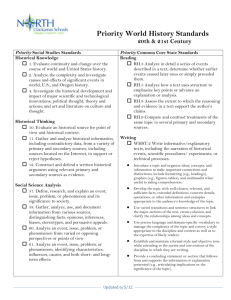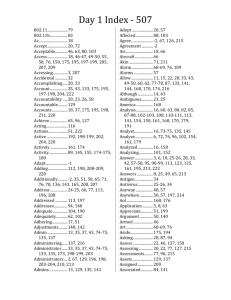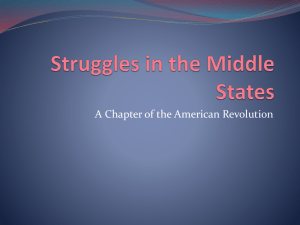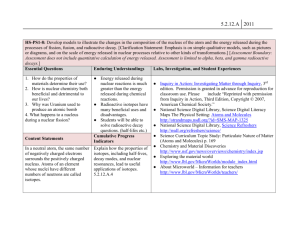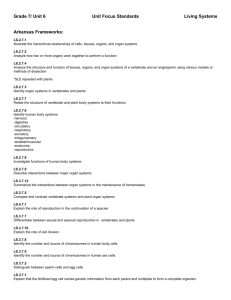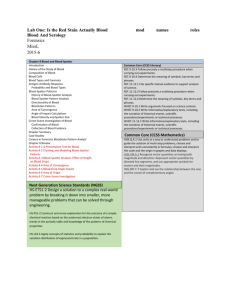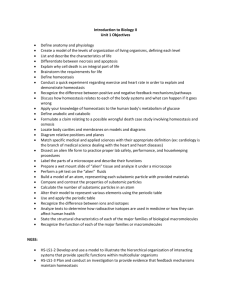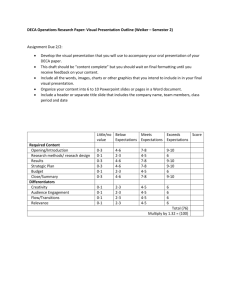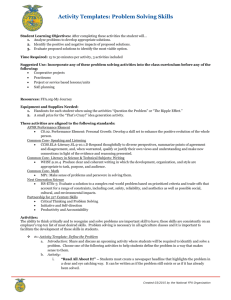Resources@MCCE - FCS DVD ROM 80.1
advertisement
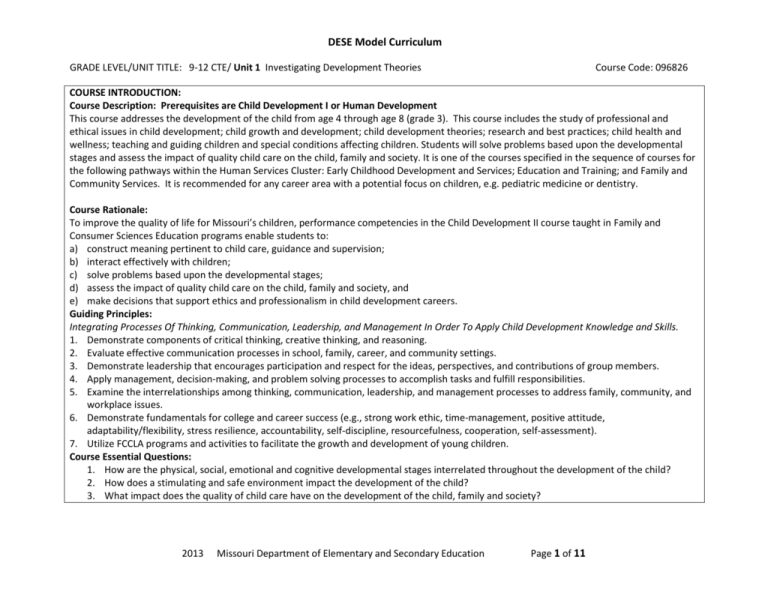
DESE Model Curriculum GRADE LEVEL/UNIT TITLE: 9-12 CTE/ Unit 1 Investigating Development Theories Course Code: 096826 COURSE INTRODUCTION: Course Description: Prerequisites are Child Development I or Human Development This course addresses the development of the child from age 4 through age 8 (grade 3). This course includes the study of professional and ethical issues in child development; child growth and development; child development theories; research and best practices; child health and wellness; teaching and guiding children and special conditions affecting children. Students will solve problems based upon the developmental stages and assess the impact of quality child care on the child, family and society. It is one of the courses specified in the sequence of courses for the following pathways within the Human Services Cluster: Early Childhood Development and Services; Education and Training; and Family and Community Services. It is recommended for any career area with a potential focus on children, e.g. pediatric medicine or dentistry. Course Rationale: To improve the quality of life for Missouri’s children, performance competencies in the Child Development II course taught in Family and Consumer Sciences Education programs enable students to: a) construct meaning pertinent to child care, guidance and supervision; b) interact effectively with children; c) solve problems based upon the developmental stages; d) assess the impact of quality child care on the child, family and society, and e) make decisions that support ethics and professionalism in child development careers. Guiding Principles: Integrating Processes Of Thinking, Communication, Leadership, and Management In Order To Apply Child Development Knowledge and Skills. 1. Demonstrate components of critical thinking, creative thinking, and reasoning. 2. Evaluate effective communication processes in school, family, career, and community settings. 3. Demonstrate leadership that encourages participation and respect for the ideas, perspectives, and contributions of group members. 4. Apply management, decision-making, and problem solving processes to accomplish tasks and fulfill responsibilities. 5. Examine the interrelationships among thinking, communication, leadership, and management processes to address family, community, and workplace issues. 6. Demonstrate fundamentals for college and career success (e.g., strong work ethic, time-management, positive attitude, adaptability/flexibility, stress resilience, accountability, self-discipline, resourcefulness, cooperation, self-assessment). 7. Utilize FCCLA programs and activities to facilitate the growth and development of young children. Course Essential Questions: 1. How are the physical, social, emotional and cognitive developmental stages interrelated throughout the development of the child? 2. How does a stimulating and safe environment impact the development of the child? 3. What impact does the quality of child care have on the development of the child, family and society? 2013 Missouri Department of Elementary and Secondary Education Page 1 of 11 DESE Model Curriculum GRADE LEVEL/UNIT TITLE: 9-12 CTE/ Unit 1 Investigating Development Theories Course Code: 096826 UNIT DESCRIPTION: Unit 1 – INVESTIGATING DEVELOPMENT THEORIES SUGGESTED UNIT TIMELINE: 3 weeks Understanding the relationships among Developmental Stages and how to encourage healthy growth (Physical, Social, Emotional, and Cognitive). CLASS PERIOD (min.): Total 450 min. ESSENTIAL QUESTIONS: 1. How has the different theorist impacted education? 2. What are the relationships between developmental stages (physical, social, emotional, cognitive)? CROSSWALK TO STANDARDS ESSENTIAL MEASURABLE LEARNING OBJECTIVES 1. Identify child development theories and how they impact our interactions with children (e.g., Erikson, Freud, Maslow, Montessori, Piaget, Skinner, Elkind) 2013 Missouri Department of Elementary and Secondary Education CCSS ELA Grade Level WHST.9-10.2.b WHST.9-10.2.e WHST.9-10.4 WHST.9-10.5 WHST.9-10.7 WHST.9-10.8 WHST.9-10.9 WHST.9-10.10 RI.9-10.7 RH.9-10.7 RH.9-10.9 SL.9-10.4 SL.9-10.5 Page 2 of 11 NSFCSE 4.2.1 DOK 3 DESE Model Curriculum GRADE LEVEL/UNIT TITLE: 9-12 CTE/ Unit 1 Investigating Development Theories Course Code: 096826 WHST.1112.2.b WHST.1112.2.e WHST.11-12.4 WHST.11-12.5 WHST.11-12.7 WHST.11-12.8 WHST.11-12.9 WHST.11-12.10 RI.11-12.7 RH.11-12.7 RH.11-12.9 SL.11-12.4 SL.11-12.5 2. Identify brain development research associated with the development of children WHST.9-10.2.b WHST.9-10.2.e WHST.9-10.4 WHST.9-10.5 WHST.9-10.7 WHST.9-10.8 WHST.9-10.9 WHST.9-10.10 RI.9-10.7 RH.9-10.7 RH.9-10.9 SL.9-10.4 SL.9-10.5 WHST.1112.2.b 2013 Missouri Department of Elementary and Secondary Education Page 3 of 11 4.3.1 12.1.3 4.2.4 2 DESE Model Curriculum GRADE LEVEL/UNIT TITLE: 9-12 CTE/ Unit 1 Investigating Development Theories Course Code: 096826 WHST.1112.2.e WHST.11-12.4 WHST.11-12.5 WHST.11-12.7 WHST.11-12.8 WHST.11-12.9 WHST.11-12.10 RI.11-12.7 RH.11-12.7 RH.11-12.9 SL.11-12.4 SL.11-12.5 3. Investigate the physical developmental stages of children WHST.9-10.4 WHST.9-10.7 WHST.9-10.9 RH.9-10.2 RH.9-10.3 RL.9-10.2 WHST.11-12.4 WHST.11-12.7 WHST.11-12.9 RH.11-12.2 RH.11-12.3 RL.11-12.2 2013 Missouri Department of Elementary and Secondary Education Page 4 of 11 4.2.3 4.2.4 4.2.5 12.1.1 12.1.2 12.1.3 12.2.4 12.3.1 13.1.4 13.2.3 4 DESE Model Curriculum GRADE LEVEL/UNIT TITLE: 9-12 CTE/ Unit 1 Investigating Development Theories 4. Research the social developmental stages of children Course Code: 096826 WHST.9-10.4 WHST.9-10.7 WHST.9-10.9 RH.9-10.2 RH.9-10.3 RL.9-10.2 WHST.11-12.4 WHST.11-12.7 WHST.11-12.9 RH.11-12.2 RH.11-12.3 RL.11-12.2 5. Research the emotional developmental stages of children WHST.9-10.4 WHST.9-10.7 WHST.9-10.9 RH.9-10.2 RH.9-10.3 RL.9-10.2 WHST.11-12.4 WHST.11-12.7 WHST.11-12.9 RH.11-12.2 RH.11-12.3 RL.11-12.2 6. Investigate the cognitive developmental stages of children 2013 Missouri Department of Elementary and Secondary Education WHST.9-10.4 WHST.9-10.7 WHST.9-10.9 RH.9-10.2 RH.9-10.3 Page 5 of 11 4.2.3 4.2.4 4.2.5 12.1.1 12.1.2 12.1.3 12.2.4 12.3.1 13.1.4 13.2.3 4 4.2.3 4.2.4 4.2.5 12.1.1 12.1.2 12.1.3 12.2.4 12.3.1 13.1.4 13.2.3 4 4.2.3 4.2.4 4.2.5 12.1.1 12.1.2 12.1.3 4 DESE Model Curriculum GRADE LEVEL/UNIT TITLE: 9-12 CTE/ Unit 1 Investigating Development Theories Course Code: 096826 RL.9-10.2 WHST.11-12.4 WHST.11-12.7 WHST.11-12.9 RH.11-12.2 RH.11-12.3 RL.11-12.2 12.2.4 12.3.1 13.1.4 13.2.3 ASSESSMENT DESCRIPTIONS*: (Write a brief overview here. Identify Formative/Summative. Actual assessments will be accessed by a link to PDF file or Word doc.) Students will research and present to the class information on a child development theorist. Formative Assessment 1_Theorist Research and PowerPoint Presentation Formative Assessment 1_Theorist Research and PowerPoint Presentation Rubric Formative Assessment 1_Theorists (questions come from student PowerPoint presentations) Students create section of multiple intelligences and brain development graphic organizer Formative Assessment 2_Multiple Intelligences and Brain Development Formative Assessment 2_Multiple Intelligences and Brain Development Rubric Individual research on areas of development Summative Assessment _Areas of Development Case Study Summative Assessment _Areas of Development Case Study Rubric *Attach Unit Summative Assessment, including Scoring Guides/Scoring Keys/Alignment Codes and DOK Levels for all items. Label each assessment according to the unit descriptions above (i.e., Grade Level/Course Title/Course Code, Unit #.) Obj. # 1 INSTRUCTIONAL STRATEGIES: (research-based): (Teacher Methods) INSTRUCTIONAL STRATEGY 1_Formative Assessment 1_Theorist Research and PowerPoint Presentation - Students research and prepare PowerPoint Presentation on selected theorist. Individual/group research and presentation on selected theorists. Include 2013 Missouri Department of Elementary and Secondary Education Page 6 of 11 DESE Model Curriculum GRADE LEVEL/UNIT TITLE: 9-12 CTE/ Unit 1 Investigating Development Theories Course Code: 096826 questions for other students to answer. 2 3 4 5 6 3 4 5 6 3 4 5 6 Obj. # INSTRUCTIONAL STRATEGY 2_ Formative Assessment 2_ Multiple Intelligences and Brain Development - Teacher instructs, directs, and assists with resources for multiple intelligences and brain development graphic organizer. INSTRUCTIONAL STRATEGY 3_ Areas of Development PowerPoint Presentation, teacher introduces unit with overview information INSTRUCTIONAL STRATEGY 4_ Summative Assessment 1_Areas of Development Case Study - Teacher instructs, directs, and assists with resources for areas of development case study INSTRUCTIONAL STRATEGY 5_ Teacher introduces and gives directions for book report, Please, Stop Laughing at Me. Evaluate book reports using the Book Report Rubric for Please, Stop Laughing at Me INSTRUCTIONAL ACTIVITIES: (What Students Do) 1 INSTRUCTIONAL ACTIVITY 1_ Formative Assessment 1_Theorist Research and PowerPoint Presentation - Students research and prepare PowerPoint Presentation on selected theorist. Individual/group research and presentation on selected theorists. Include questions for other students to answer. 2 INSTRUCTIONAL ACTIVITY 2_ Formative Assessment 2_Multiple Intelligences and Brain Development - Create a section of a graphic organizer to be displayed in class on multiple intelligences or brain development 3 4 5 6 3 4 5 6 INSTRUCTIONAL ACTIVITY 3_ Students view Areas of Development PowerPoint Presentation INSTRUCTIONAL ACTIVITY 4_ Summative Assessment _Areas of Development Case Study - Students through a case study will investigate how the areas of development are interrelated and how caregivers can encourage positive growth. 2013 Missouri Department of Elementary and Secondary Education Page 7 of 11 DESE Model Curriculum GRADE LEVEL/UNIT TITLE: 9-12 CTE/ Unit 1 Investigating Development Theories 3 4 5 6 Course Code: 096826 INSTRUCTIONAL ACTIVITY 5_ Students will read the book, Please Stop Laughing at Me and write a book report and explain how the areas of development are interrelated. UNIT RESOURCES: (include internet addresses for linking) Internet resources: www.cfw.tufts.edu (1/18/2013) www.brainline.org (1/18/2013 www.infed.org/thinkers/gardner 91/18/2013) www.tecweb.org (Howard Gardner) (1/18/2013) thirteen.org/edonline/concept.2class/mi/index (1/18/2013) www.uen.org/lesson plan (developmental theorists)(1/18/2013) www.del.wa.gov/publications/development/docs/guidelines.pdf (areas of development) (1/18/2013) www.brightfuturesforfamilies.org (areas of development) (1/18/2013) www.babycenter.com (big kid) (1/18/2013) Book: Please Stop Laughing At Me, Jodi Blanco Book: Please Stop Laughing At Us, Jodi Blanco (teacher resource) DVDS from Magna: “Middle Childhood, Social and Emotional Development” “Middle Childhood, Physical Growth and Development” 2013 Missouri Department of Elementary and Secondary Education Page 8 of 11 DESE Model Curriculum GRADE LEVEL/UNIT TITLE: 9-12 CTE/ Unit 1 Investigating Development Theories Course Code: 096826 “Middle Childhood, Cognitive and Language Development” CCSS: Common Core State Standards (CCSS), accessed May 17, 2013, from http://www.corestandards.org/ CCTC: Common Career Technical Core (CCTC), accessed May 17, 2013 from http://www.careertech.org/career-technicaleducation/cctc/info.html NSFCSE: National Standards for Family and Consumer Sciences Education:, accessed May 30, 2013 from http://www.nasafacs.org/national-standards-home.html Resources@MCCE - FCS DVD ROM 84.2 - Child Development Theorists, Learning ZoneXpress, OWATONNA, MN, LEARNING ZONEXPRESS, 2009. This program is a view of the major child development theorists, how the theories differ, and how more than one approach can be beneficial. Historical footage and photos are combined with candid documentary footage from day care centers in this program. Theorists presented include: Sigmund Freud; Maria Montessori; Arnold Gesell; Lev Vygotsky; Jean Piaget; Rudolf Dreikurs; Erik Erikson; Abraham Maslow; John Bowlby; B. F. Skinner; Benjamin Spock; Lawrence Kohlberg; T. Berry Brazelton; Diana Baumrind; Howard Gardner. Grades 9-adult. Teaching materials included. 21 minutes. Resources@MCCE - FCS 20.0200 A532 - 50 Web-based Lesson Plans for Parenting & Child Development, Updated 2006, Colleen Angel, OWATONNA, MN, LEARNING ZONEXPRESS, 2006. This resource includes summary, web address, questions, and creative homework assignment or activity for each lesson. Topics covered: Child Development Basics; Theories & Theorists; Growth & Development; Pregnancy; Child Safety & Child Health; Parenting. Grades 6-12. Resources@MCCE - FCS CD ROM 5.1 - Ages & Stages of Child Development Powerpoint: Newborn to School Age, Learning ZoneXpress, OWATONNA, MN, LEARNING ZONEXPRESS, 2006. Program designed to help students, childcare providers and educators to identify the physical, intellectual, emotional, social and moral characteristics of each developmental stage. Covers the types of growth and suggests stimulation of development in newborns, infants, toddlers, and preschoolers to school-age children. Slide design updated in 2010. Grades 9-adult. Resources@MCCE - FCS DVD ROM 80 - Preschoolers: Cognitive Development, Magna Systems, LAKE ZURICH, IL, MAGNA SYSTEMS, 2008. Using footage of preschoolers in the classroom, graphics and interviews with teachers and caregivers, this program delivers a detailed overview of the cognitive development that takes place between the ages of three and five. This program shows how the 2013 Missouri Department of Elementary and Secondary Education Page 9 of 11 DESE Model Curriculum GRADE LEVEL/UNIT TITLE: 9-12 CTE/ Unit 1 Investigating Development Theories Course Code: 096826 brain grows neural bridges and strengthens a child?s intellect, widely studied developmental theories of cognitive development and how to encourage it and characteristics of preoperational thought. Also covered are areas of language development, how children use symbolic thought and how ?theory of the mind? helps preschoolers understand what the mind is and how it works. Demonstrates teaching methods to guide preschoolers to higher-order thinking skills. Audience: General, College. 24 minutes Resources@MCCE - FCS DVD ROM 80.1 - Infants: Cognitive Development, Learning Seed, CHICAGO, IL, LEARNING SEED, 2010. This program examines how newborns fit into the sensorimotor stage - tracing cognitive development from simple reflexes to beginnings of thought. Explores infant intelligence, information processing and memory. Progression of infant communication from crying to babbling and first words is examined. Provides an understanding of how language is learned and how caregivers can use infantdirected speech to foster cognitive development. 28 minutes. Resources@MCCE - FCS DVD ROM 80.2 - Toddlers: Cognitive Development, Learning Seed, CHICAGO, IL, LEARNING SEED, 2009. This program examines how brain cells are structured to connect and retain what a child learns, and explores theories of cognitive development and the process toddlers go through as they learn language. Viewers observe toddlers as they engage in activities that foster memory and the retrieval of information. 26 minutes. Resources@MCCE - FCS DVD ROM 81 - Preschoolers: Physical Development, Magna Systems, LAKE ZURICH, IL, MAGNA SYSTEMS, 2008. Viewers will learn the physical characteristics of preschoolers, how gross and fine motor skills are developed and the physical milestones that most children reach during this stage. This program also looks at the natural activities children are drawn to which help their physical development and strategies to encourage these activities. Also covers the physical challenges that some children have, activity modifications to help children with physical challenges and why good nutrition and the proper amount of sleep are crucial at this age. Audience: General, College. 21 minutes Resources@MCCE - FCS DVD ROM 81.1 - Infants: Physical Development, Learning Seed, CHICAGO, IL, LEARNING SEED, 2010. Viewers learn how a baby’s brain develops and what activities help stimulate healthy brain growth. Also learn the importance of proper nutrition and sleep in the first year. See how infants rely on their innate reflexes and how gross and fine motor skills emerge in typically developing children as well as those with challenging conditions. 30 minutes. Resources@MCCE - FCS DVD ROM 81.2 - Toddlers: Physical Development, Learning Seed, CHICAGO, IL, LEARNING SEED, 2009. Viewers learn about the physical characteristics of toddlers, and how gross and fine motor skills are developed. Understand the milestones children achieve at this age by observing toddlers in learning centers and at home. Hear from the experts about nutrition, sleep, toilet training, and developmental differences among toddlers. 29 minutes. 2013 Missouri Department of Elementary and Secondary Education Page 10 of 11 DESE Model Curriculum GRADE LEVEL/UNIT TITLE: 9-12 CTE/ Unit 1 Investigating Development Theories Course Code: 096826 Resources@MCCE - FCS DVD ROM 82 - Preschoolers: Social & Emotional Development, Magna Systems, LAKE ZURICH, IL, MAGNA SYSTEMS, 2008. Viewers will learn: The skill set that makes up social and emotional development; the value of encouraging creativity and risk taking; activities that foster initiative and positive self-esteem; how culture and gender affect development; levels of social participation; examples of pro-social and antisocial behaviors and ways caregivers can develop skills. Audience: General, College. 23 minutes Resources@MCCE - FCS DVD ROM 82.1 - Infants: Social & Emotional Development, Learning Seed, CHICAGO, IL, LEARNING SEED, 2010. This program examines the different stages of emotional development, and learn how children form attachments with people. Viewers observe how personality and temperament affect an infant’s social and emotional growth and how caregivers handle various situations. 23 minutes. Resources@MCCE - FCS DVD ROM 82.2 - Toddlers: Social & Emotional Development, Learning Seed, CHICAGO, IL, LEARNING SEED, 2009. Viewers learn about the theory of the mind and how toddlers come to understand how their actions can affect others. This program examines how gender and temperament play a role in development. Viewers observe toddlers interacting with family and peers as they develop attachments and social bonds. 29 minutes. 2013 Missouri Department of Elementary and Secondary Education Page 11 of 11
